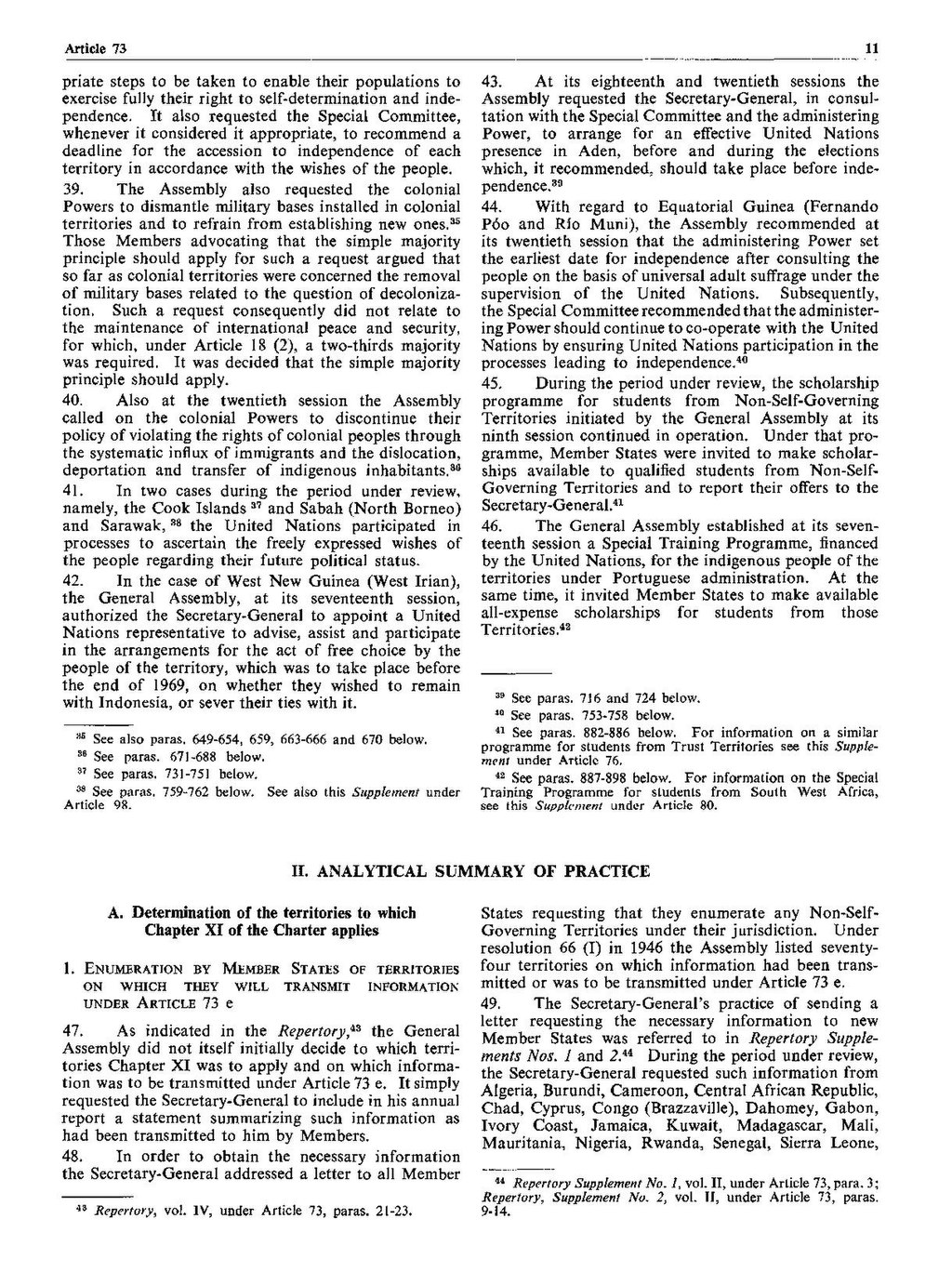priate steps to be taken to enable their populations to exercise fully their right to self-determination and independence. It also requested the Special Committee, whenever it considered it appropriate, to recommend a deadline for the accession to independence of each territory in accordance with the wishes of the people.
39. The Assembly also requested the colonial Powers to dismantle military bases installed in colonial territories and to refrain from establishing new ones.[1] Those Members advocating that the simple majority principle should apply for such a request argued that so far as colonial territories were concerned the removal of military bases related to the question of decolonization. Such a request consequently did not relate to the maintenance of international peace and security, for which, under Article 18 (2), a two-thirds majority was required. It was decided that the simple majority principle should apply.
40. Also at the twentieth session the Assembly called on the colonial Powers to discontinue their policy of violating the rights of colonial peoples through the systematic influx of immigrants and the dislocation, deportation and transfer of indigenous inhabitants.[2]
41. In two cases during the period under review, namely, the Cook Islands[3] and Sabah (North Borneo) and Sarawak,[4] the United Nations participated in processes to ascertain the freely expressed wishes of the people regarding their future political status.
42. In the case of West New Guinea (West Irian), the General Assembly, at its seventeenth session, authorized the Secretary-General to appoint a United Nations representative to advise, assist and participate in the arrangements for the act of free choice by the people of the territory, which was to take place before the end of 1969, on whether they wished to remain with Indonesia, or sever their ties with it.
43. At its eighteenth and twentieth sessions the Assembly requested the Secretary-General, in consultation with the Special Committee and the administering Power, to arrange for an effective United Nations presence in Aden, before and during the elections which, it recommended, should take place before independence.[5]
44. With regard to Equatorial Guinea (Fernando Poo and Rio Muni), the Assembly recommended at its twentieth session that the administering Power set the earliest date for independence after consulting the people on the basis of universal adult suffrage under the supervision of the United Nations. Subsequently, the Special Committee recommended that the administering Power should continue to co-operate with the United Nations by ensuring United Nations participation in the processes leading to independence.[6]
45. During the period under review, the scholarship programme for students from Non-Self-Governing Territories initiated by the General Assembly at its ninth session continued in operation. Under that programme, Member States were invited to make scholarships available to qualified students from Non-SelfGoverning Territories and to report their offers to the Secretary-General. [7]
46. The General Assembly established at its seventeenth session a Special Training Programme, financed by the United Nations, for the indigenous people of the territories under Portuguese administration. At the same time, it invited Member States to make available all-expense scholarships for students from those Territories.[8]
II. ANALYTICAL SUMMARY OF PRACTICE
A. Determination of the territories to which
Chapter XI of the Charter applies
- 1. ENUMERATION BY MEMBER STATES OF TERRITORIES ON WHICH THEY WILL TRANSMIT INFORMATION UNDER ARTICLE 73 e
47. As indicated in the Repertory[9] the General Assembly did not itself initially decide to which territories Chapter XI was to apply and on which information was to be transmitted under Article 73 e. It simply requested the Secretary-General to include in his annual report a statement summarizing such information as had been transmitted to him by Members.
48. In order to obtain the necessary information the Secretary-General addressed a letter to all Member States requesting that they enumerate any Non-Self-Governing Territories under their jurisdiction. Under resolution 66 (I) in 1946 the Assembly listed seventy four territories on which information had been transmitted or was to be transmitted under Article 73 e.
49. The Secretary-General's practice of sending a letter requesting the necessary information to new Member States was referred to in Repertory Supplements Nos. 1 and 2.[10]During the period under review, the Secretary-General requested such information from Algeria, Burundi, Cameroon, Central African Republic, Chad, Cyprus, Congo (Brazzaville), Dahomey, Gabon, Ivory Coast, Jamaica, Kuwait, Madagascar, Mali, Mauritania, Nigeria, Rwanda, Senegal, Sierra Leone,
- ↑ See also paras. 649-654, 659, 663-666 and 670 below. See paras. 671-688 below.
- ↑ See also paras. 649-654, 659, 663-666 and 670 below. See paras. 671-688 below.
- ↑ See paras. 731-751 below.
- ↑ See paras. 759-762 below. See also this Supplement under Article 98.
- ↑ See paras. 716 and 724 below.
- ↑ See paras. 753-758 below.
- ↑ See paras. 882-886 below. For information on a similar programme for students from Trust Territories see this Supplement under Article 76.
- ↑ See paras. 887-898 below. For information on the Training Programme for students from South West see this Supplement under Article 80.
- ↑ Repertory, vol. IV, under Article 73, paras. 21-23.
- ↑ Repertory Supplement No. 1, vol. II, under Article 73, para. 3; Repertory, Supplement No. 2, vol. II, under Article 73, paras. 9-14.
